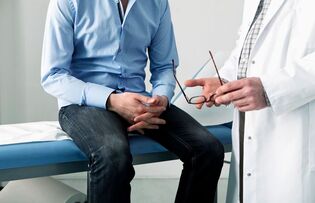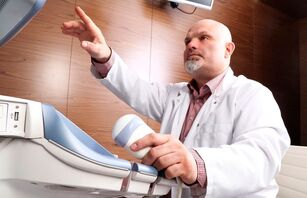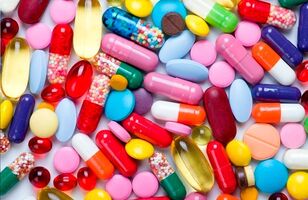Prostatitis is an inflammation of the prostate that is primarily diagnosed in people aged 35-45. Such a disease can develop only in men, because the prostate is absent in the female body. Why does the disease occur and what factors contribute to its development? How to treat prostatitis and what are the risks of complications?
Prostatitis in men
Given disappointing statistics, the incidence of prostatitis is on the rise. Today, prostate inflammation affects almost half of the entire male population between the ages of 30 and 70. It should be noted that prostatitis will progress if not treated properly or not. Untimely access to a doctor is fraught with negative consequences in the form of complications: gland abscess or infertility.
The prostate is a rounded organ located below the bladder and involved in the production of sperm (semen). During ejaculation, the muscular parts of the prostate contract, preventing the semen from entering the bladder and the urine from entering the semen. Glandular dysfunction can cause male infertility.
There are several classifications of prostatitis, distinguish:
- acute inflammation of the prostate;
- chronic bacterial and nonbacterial prostatitis;
- asymptomatic disease.
Inflammation of the prostate is often accompanied by vesiculitis or urethritis (inflammation of the urethra).
Acute prostatitis
The acute form of the disease usually occurs spontaneously and is accompanied by a number of unpleasant symptoms. This condition requires urgent medical attention. Staphylococci, Pseudomonas aeruginosa or Escherichia coli and Enterobacter can cause an acute inflammatory process. Some microorganisms are part of the normal microflora, but entering the prostate can cause the development of tissue inflammation.
There are several types of acute inflammation:
- catarrhal;
- parenchymal;
- follicular;
- organ abscess.
An experienced qualified doctor can easily diagnose acute prostatitis using modern laboratory tests. Severe symptoms and a typical clinical picture will enable diagnosis quickly and correctly. Treat the acute type of disease comprehensively. Initially, an antibiotic is used to remove the pathogenic infection. Also, effective therapy includes: drugs to strengthen the immune system, drugs to improve blood circulation in the gland, physiotherapy procedures if necessary. But the benefits of massage for prostatitis have not been proven.
Chronic bacterial prostatitis
Chronic prostatitis with bacterial etiology is a prostate disease that has characteristic symptoms. Signs of the disease include pain syndrome, urination disorders, and psychological discomfort. Inflammatory-type changes can also occur in biological fluids, including glandular secretions, semen, and urine. Chronic bacterial prostatitis always has a pathogenic agent that is determined by laboratory tests at several levels.
Infectious prostatitis is most often associated with microorganisms of the genus Enterobacteriaceae. The main causes of prostatitis are trichomonas, ureplasma, gonococcus, mycoplasma, chlamydia, gardnerella. Inflammation can be caused by Mycobacterium tuberculosis or fungi of the genus Candida if a man is infected with HIV. Other pathogenic microorganisms, including Klebsiella, Proteus and Enterococcus, provoke the disease.
Chronic nonbacterial prostatitis
Chronic nonbacterial prostatitis may have signs of inflammation or be almost asymptomatic. Only a competent urologist can identify the disease and make a diagnosis based on the results of a complete diagnosis of the patient's condition.
Inflammatory prostatitis
Chronic nonbacterial prostatitis with signs of inflammation can be diagnosed through patient complaints and laboratory test results. In the secretion of the gland after prostate massage there is an increased content of leukocytes. No pathogenic microorganisms were detected.
Non-inflammatory prostatitis and chronic pelvic pain syndrome
If the urologist does not detect an infection during the diagnosis, then the diagnosis may sound like non-inflammatory prostatitis. The main symptom of the disease in this case is constant / recurrent and prolonged pain in the pelvic area. Such an unpleasant syndrome can be disrupted for up to 2-4 months.
Asymptomatic chronic prostatitis
Asymptomatic chronic prostatitis has virtually no symptoms. Such inflammation of the gland runs without visible symptoms. The doctor may detect the problem due to the periodic or constant secretion of leukocytes and bacteria in the urine. This form of the disease is treated with nonsteroidal anti-inflammatory drugs and antibiotics.
As practice shows, the symptoms of inflammation of the prostate tissue can be easily confused with other pathologies affecting the pelvic organs. Self-medication can cause complications, the development of additional diseases, or critical conditions.
Causes of prostatitis in men

It is impossible to talk about the only cause of prostate inflammation, because this disease is multifactorial and can occur in the background of various circumstances. Assign hormonal disorders, hypothermia, significant reduction of immune defenses, circulatory disorders, sexually transmitted diseases and sexual abstinence.
Infectious
Pathogenic microorganisms can enter the prostate during inflammation that occurs in the bladder and urethra. The infection can also penetrate the prostate due to hematogenous pathways, for example from purulent foci (during tonsillitis, pneumonia or furunculosis). The causative agents can be: Escherichia coli, staphylococci and enterococci.
Symptoms of prostatitis often occur due to sexually transmitted diseases. Inflammation of the prostate occurs due to an infection that affects the tissues of the organs. Acute prostatitis can be caused by the herpes virus or mycoplasma infection, which affects not only the reproductive system. Chlamydia is also worth mentioning. Gram-negative intracellular microorganisms cause approximately 40-60% of all urogenital infections.
The secretory gland contains bactericidal substances that prevent the development of infections within the organs. In order for the infection to spread and an inflammatory process to occur, additional factors are needed, which include stagnation in the circulatory system of the small pelvis or a blockage of glandular secretion.
Hypothermia, due to which the activity of immune cells and the protective function of the mucosa is significantly reduced, can be attributed to factors that contribute to the spread or activation of the infection. It also includes physical and neuropsychic overwork, which negatively affects immunity.
Non-infectious
There are several non-infectious causes of inflammation of the tissues in the prostate. Signs of prostatitis can occur due to a violation of the mechanics of the entire process of excretion of urine, because urination is carried out due to the periodic relaxation of the circular muscles of the prostate and bladder. Various violations of this process, including failures associated with variability in muscle function (tension and tissue contraction), contribute to the entry of urine into the prostate ducts. This situation can negatively affect the organ, cause irritation and, as a result, the symptoms of prostatitis.
Unnatural prolongation, termination of intercourse, or prolonged abstinence can also lead to symptoms or the development of prostatitis. Stagnation and swelling of the prostate can lead to secretion in a gland that is fully formed but is not secreted from the organs or is partially secreted.
Circulatory disorders and inactive lifestyle
Tight underwear, too tight a belt, tight pants and shorts and a sedentary lifestyle are often the causes of circulatory disorders in the pelvic area. The gland is flooded with blood, compression of blood vessels is noticed, delays in the transport of nutrients occur. Such changes lead to gland malfunction.
Hormonal Disorders
The amount of sex hormones plays a special role in prostate function. They are able to affect the activity of prostate cells. And hormonal overload can increase the risk of signs of prostatitis.
The prostate is involved in stabilizing the hormone balance in the genital area, and organ dysfunction leads to malfunction. In particular, in chronic prostatitis, the index of dihydrotestosterone decreases, and the saturation of estrogen increases. The extent of hormonal imbalance in prostatitis will depend on the characteristics and stage of the disease, which can only be determined by an expert.
Symptoms of prostatitis

All the obvious signs of prostatitis represent a whole complex of different disorders. Moreover, each type of such disease can have its own individual symptoms. For example, acute prostatitis may be accompanied by fever, a sudden rise in body temperature, and other symptoms of severe intoxication of the body. Both chronically impaired ejaculation and decreased sexual desire.
All symptoms of prostatitis can be divided into 3 separate categories:
- urination disorders;
- problems with sexual function;
- mental disorders.
Urinary problems as signs of prostatitis
All patient complaints regarding urination may occur due to:
- irritation of nerve endings, which occurs in the background of the inflammatory process;
- narrowing of the urethral lumen.
In this case, the symptoms of prostatitis can be:
- slow jet;
- difficulty starting to urinate and emptying drop by drop;
- feeling that the bladder is not completely emptied;
- a sharp urge to urinate;
- urinary incontinence during instinct;
- Increased urination.
Pain syndrome
Painful discomfort with prostatitis can be seen in the lower abdomen. The pain can radiate to the lower back, groin, scrotum, and even the anus. Also, the patient may complain of groin pain after a long stay in a sitting position. The pain may be sharp or dull.
Disorders in intimate life
Symptoms of prostatitis include problems in the intimate area:
- decreased libido;
- ejaculation disorders (increase or decrease in semen volume);
- erectile dysfunction, complete or partial sexual dysfunction;
- pain during ejaculation.
Among the signs of prostatitis can be distinguished dull and sluggish orgasms, as well as discharge from the urethra of mucous consistency.
Mental imbalance
Men often have psychological difficulties when faced with diseases of the genitourinary system. Due to erection problems, pain or rapid ejaculation, the patient may withdraw, become aggressive towards others or simply feel anxiety, fear. Stresses appear that can negatively affect the immune system, significantly weakening it.
Along with the depressed state, there are also psychological experiences, expectations of failure in intimate life. Doctors often talk about the importance of paying attention to the psychological state of patients with chronic inflammation of the prostate.
Diagnosis of prostatitis

The doctor prescribes a comprehensive diagnosis for a patient with urological problems. If prostatitis is suspected, laboratory tests, ultrasound, and rectal digital examination are performed. If after the course of prescribed therapy the symptoms of the disease do not disappear, the urologist can refer the patient for additional diagnosis:
- blood culture;
- computer or magnetic resonance imaging;
- bacteriological examination of semen.
Urological examination
A urological examination by a doctor is the first important step without which it is impossible to make a correct diagnosis. Thanks to the visual examination and the clinical picture, the expert will determine the possible disease and prescribe additional diagnostic procedures.
Digital examination of the gland is a mandatory method. This procedure is performed through the anus. Examination does not usually cause pain to the patient, although mild discomfort is usually observed. During the urological examination, the doctor will take into account the complaints, the age of the patient and the presence of chronic pathologies.
Laboratory research
There is a list of urological methods for laboratory examination of men, which includes general urine analysis and blood tests for HIV, markers of hepatitis C and B, as well as for RW. Patients with suspected inflammation of the prostate are often prescribed:
- urine analysis that determines the presence of pathogenic flora;
- examination of glandular secretion;
- blood tests for sexually transmitted infections and the presence of prostate-specific antigen, to rule out cancer.
Ultrasound examination of the prostate, bladder and kidneys
In the case of prostatitis, an ultrasound examination of the gland, bladder and kidneys is performed for diagnosis. With the help of such a diagnosis, the medical specialist will be able to identify almost all pathological changes, including tumors and tissue inflammations. Ultrasound helps to assess not only the condition of the organs, but also the blood flow. If necessary, a transrectal study is performed to better visualize the organs.
With an ultrasound examination of the prostate, the doctor assesses the shape, size, structure, as well as the density and homogeneity of the organs. Signs of prostatitis are easy to recognize by ultrasound. Also, depending on the results of the study, adenomas and tumors, including cancer, can be detected.
In case of prostate inflammation, for the sake of completeness of the clinical picture, the urologist prescribes ultrasound of the kidneys and bladder. An effective diagnosis can identify:
- cystic inclusions;
- presence of calcifications;
- tissue thickening;
- contour irregularities;
- changes in tissue echogenicity;
- organ size, extension and echo density.
Only a doctor can make a diagnosis based on ultrasound results. Making conclusions or prescribing treatment on your own is dangerous and threatens serious consequences.
Uroflowmetry
Uroflowmetry is a medical diagnosis. This method records the speed of urine during urination, which allows you to identify violations associated with the patency of the ducts, the activity of muscle tissue and their tone. It is performed on special equipment - with the help of graphics and digital images, the uroflormeter will sketch the results.
Treatment of prostatitis

It is impossible to talk about the treatment of prostatitis as a specific list of manipulations and measures, because there are several types of diseases and each of them requires its own individual therapy.
Treatment of prostatitis with folk remedies
Treatment of prostatitis at home can be carried out only after consulting a doctor. The competent medical specialist will prescribe medication, and possibly physiotherapy and therapeutic exercises. Prescriptions of traditional medicine may also be recommended, but they should not be the main therapeutic method.
Treatment of prostatitis at home should be carried out carefully and taking into account all the recommendations of the doctor. The urologist may recommend herbal infusions and decoctions, candles with honey and syrups. It is important to know that any recipe for alternative medicine has its contraindications. You cannot treat and buy suspicious products on your own, including massagers, bracelets, prostatitis patches, especially underwear or pillows. Unjustified purchase and use of drugs without the advice of a doctor can become a fatal mistake that will lead to additional diseases or worsen the patient's condition.
Home Herbal Treatment for Prostatitis
An herbal remedy for prostatitis can help alleviate the unpleasant symptoms of glandular inflammation. It is used as an adjunct to medical (drug) therapy. The urologist will, if necessary, prescribe useful prescriptions based on the characteristics of the patient's condition, his age and the presence of chronic pathologies.
Home treatment for prostatitis requires a serious attitude towards your health. You can prepare a bath or enema based on herbal preparations at home, but the doctor should indicate the components, method of preparation and dosage. In such cases, the most commonly recommended use is: cumin plants, apothecary chamomile flowers, marsh creepers, sage, corn silk, ivan tea, marshmallow root, licorice rhizome and linden blossom.
Also popular:
- Parsley. It has a strengthening effect on blood vessels and has an anti-inflammatory effect. The seeds are especially useful, they are added in crushed form to various recipes of alternative medicine. Ginseng. The root of this plant increases the tone of blood vessels. It has a stimulating effect.
- Our Lady's grass. The plant has antibacterial and soothing properties. The plant is necessary for depressive disorders, for the prevention and treatment of stress, which, for example, can occur in the background of erectile dysfunction.
Provided that all medical prescriptions are followed, certain prescriptions of traditional medicine can enhance the effect of therapy.
Hirudotherapy
Hirudotherapy for the treatment of prostatitis at home raises many doubts among experts around the world. Therapy with medicinal leeches specially grown in biofactories is somewhat curative, and the saliva of the annelide worm also has medicinal properties. It contains several useful active substances, among which hirudin is worth mentioning. In prostatitis, leeches are applied to the skin just above the pubic area, in the groin and anus. The therapy has its nuances, which your doctor will tell you about. Self-medication is dangerous.
In which cases can prostatitis not be treated at home?
There are a number of alarming symptoms in acute or chronic prostatitis, in which it is important to seek the help of a competent doctor immediately:
- sharp pain in the lower abdomen;
- discharge of blood when urinating;
- blood in stool;
- increased body temperature, dizziness, chills, vomiting.
It is important to treat prostatitis at home under the strict supervision of a urologist. Any medications or prescriptions of alternative medicine must be discussed with your doctor before use. Do not take your medicine on the advice of, for example, a friend or pharmacist at the pharmacy. You run the risk of harming your body and causing a number of negative reactions.
Treating prostatitis with folk remedies without consulting a specialist can end in failure. Take care of your health.
Treatment of prostatitis in men: drugs

What should be the medical treatment for prostatitis in men, what type of medication does the doctor prescribe? Typically, treatment for acute and chronic prostatitis involves antibiotics. It is advisable to choose such drugs taking into account the culture that determines the sensitivity to a particular antibiotic.
Prostatitis medications: antibiotics and anti-inflammatory drugs
Prostatitis medications can only be prescribed by a doctor based on the patient’s diagnosis results, including responses to laboratory texts. It is important to know that beta-lactam and nitrafuran prostatitis agents are ineffective because they cannot penetrate prostate tissue. Good results should not be expected from such treatment of prostatitis.
Currently, drugs from the fluoroquinolone and macrolide groups show the best results in the treatment of prostatitis in men. To eliminate the symptoms associated with urinary disorders, a urologist may prescribe a prostatitis medication in the form of an alpha-blocker, as well as anti-inflammatory medications. Herbal remedies, hormonal drugs and immunocorrective drugs are popular.
Traditional medical treatment of prostatitis in men can be supplemented with physical therapy. Such a therapeutic technique is used as a cure for prostatitis in the absence of symptoms of the acute form of the disease.
Prostatitis patch
Today, men with prostatitis often hear about prostatitis patches. Manufacturers of questionable products offer quality prevention or quick recovery.
This therapy can not be called the treatment of prostatitis folk remedies. It is not related to alternative medicine, but it is not used in practice by qualified doctors. The prostatitis patch has no evidence base. Neither doctors nor actual customer reviews confirm the effectiveness of the Chinese universal prostatitis patch.
Prostatitis Suppositories
Suppositories for prostatitis are most often prescribed in combination with antibiotics and anti-inflammatory drugs. Rectal suppositories can eliminate the causes of prostatitis, have a healing effect and alleviate tissue inflammation. Suppositories for prostatitis are in principle similar to microclysters. Only suppositories consist of fats and oils, and enemas are mostly water.
Coconut oil is most often the basis of suppositories for prostatitis. It is this component that contributes to the almost instantaneous absorption of medicinal substances in the intestinal walls. Also, suppositories for prostatitis often contain vitamins.
Physiotherapy as a complementary remedy for prostatitis

If we consider all the complex treatment of prostatitis in men, then drugs are the main part of the therapy. Physiotherapy is an additional method that helps treat prostatitis in men. Prescribe procedures for inflammation of the prostate, provided that there are no acute symptoms.
If you do not know how and how prostatitis in men is treated with physiotherapy, then you should list the most common:
- drug electrophoresis;
- UHF therapy (electric field treatment using capacitor plates);
- magnetotherapy (therapeutic effect of the magnetic field on the patient's body);
- mud therapy;
- microclysters with herbal infusions and decoctions (such physiotherapy is the treatment of chronic acute prostatitis folk remedies);
- general and local baths that use different fluids and temperature conditions;
- galvanizing (exposure to low voltage direct current on the human body).
How to treat prostatitis, gland massage
Massage, a popular method of treating prostatitis, today (according to numerous studies) has no evidence of its effectiveness. If a man has prostatitis, massage can be used to stimulate the secretion from the prostate. Such manipulation is performed through the anus with the help of fingers only in a medical institution under the guidance of a specialist.
It is strictly forbidden, if there is prostatitis, to massage the adenoma and cysts of the glands, cracks in the anus, with retention of urine and fever. Acute infectious processes in the bladder or kidneys are also contraindications.






























